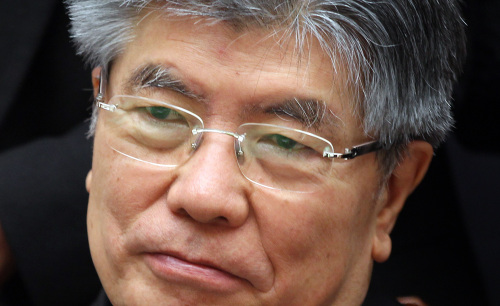
The Bank of Korea is considering a set of measures that include a hike in bank reserve requirements in order to rein in consumer prices.
“Given that price stability is deemed the most important issue, the Bank of Korea is reviewing short-term policy measures to stabilize consumer prices in addition to the mid-term and long-term tool of adjusting the benchmark interest rate,” a high-ranking BOK official told the local press Monday.
To that end, the central bank is likely to raise the bank reserve requirement, or cash reserve ratio, for the first time in six years, underscoring the depth of the inflation problem that threatens the country’s domestic spending.
The BOK sets the minimum reserves each lender must hold of customer deposits and notes, a monetary policy tool that influences the country’s borrowing and interest rates by changing the amount of loans available.
Using the reserve requirement as an inflation-fighting tool illustrates that the BOK is determined to tame consumer prices, which rose 4.2 percent in December amid deepening worries over their negative impact on the economy.
The central is also exploring a cut in the loans it makes to commercial banks at lower rates, another measure that will control liquidity.
If both measures get implemented, the liquidity on the market will shrink in a way that keeps consumer prices from going up, even without raising the benchmark interest rate.
The central bank froze the key rate at 3.25 percent in December for the sixth straight month, citing greater external uncertainties such as the eurozone fiscal crisis, despite growing inflation risks. In 2011, the country’s inflation stood at 4 percent, hitting the upper ceiling of the BOK’s 2-4 percent target band for 2010-2012.
Analysts and economists expect the BOK to keep the rate unchanged in January as well, due to the continued external risks that threaten Asia’s fourth-largest economy. The growth of exports, which make up half of the country’s economy, is also slowing down, making it all the more difficult for the central bank to raise the rate as it would likely put downward pressure on the economic growth rate.
The BOK raised the average cash reserve ratio from 3 percent to 3.8 percent in 2006. Since then, it has not opted to use the tool as it used rate-setting monetary policy to achieve its target inflation growth.
By Yang Sung-jin (insight@heraldcorp.com)
“Given that price stability is deemed the most important issue, the Bank of Korea is reviewing short-term policy measures to stabilize consumer prices in addition to the mid-term and long-term tool of adjusting the benchmark interest rate,” a high-ranking BOK official told the local press Monday.
To that end, the central bank is likely to raise the bank reserve requirement, or cash reserve ratio, for the first time in six years, underscoring the depth of the inflation problem that threatens the country’s domestic spending.
The BOK sets the minimum reserves each lender must hold of customer deposits and notes, a monetary policy tool that influences the country’s borrowing and interest rates by changing the amount of loans available.
Using the reserve requirement as an inflation-fighting tool illustrates that the BOK is determined to tame consumer prices, which rose 4.2 percent in December amid deepening worries over their negative impact on the economy.
The central is also exploring a cut in the loans it makes to commercial banks at lower rates, another measure that will control liquidity.
If both measures get implemented, the liquidity on the market will shrink in a way that keeps consumer prices from going up, even without raising the benchmark interest rate.
The central bank froze the key rate at 3.25 percent in December for the sixth straight month, citing greater external uncertainties such as the eurozone fiscal crisis, despite growing inflation risks. In 2011, the country’s inflation stood at 4 percent, hitting the upper ceiling of the BOK’s 2-4 percent target band for 2010-2012.
Analysts and economists expect the BOK to keep the rate unchanged in January as well, due to the continued external risks that threaten Asia’s fourth-largest economy. The growth of exports, which make up half of the country’s economy, is also slowing down, making it all the more difficult for the central bank to raise the rate as it would likely put downward pressure on the economic growth rate.
The BOK raised the average cash reserve ratio from 3 percent to 3.8 percent in 2006. Since then, it has not opted to use the tool as it used rate-setting monetary policy to achieve its target inflation growth.
By Yang Sung-jin (insight@heraldcorp.com)
-
Articles by Korea Herald




![[Weekender] Korean psyche untangled: Musok](http://res.heraldm.com/phpwas/restmb_idxmake.php?idx=644&simg=/content/image/2024/05/02/20240502050841_0.jpg&u=)

![[Eye Interview] 'If you live to 100, you might as well be happy,' says 88-year-old bestselling essayist](http://res.heraldm.com/phpwas/restmb_idxmake.php?idx=644&simg=/content/image/2024/05/03/20240503050674_0.jpg&u=)











![[Herald Interview] Director of 'Goodbye Earth' aimed to ask how we would face apocalypse](http://res.heraldm.com/phpwas/restmb_idxmake.php?idx=652&simg=/content/image/2024/05/03/20240503050732_0.jpg&u=)
